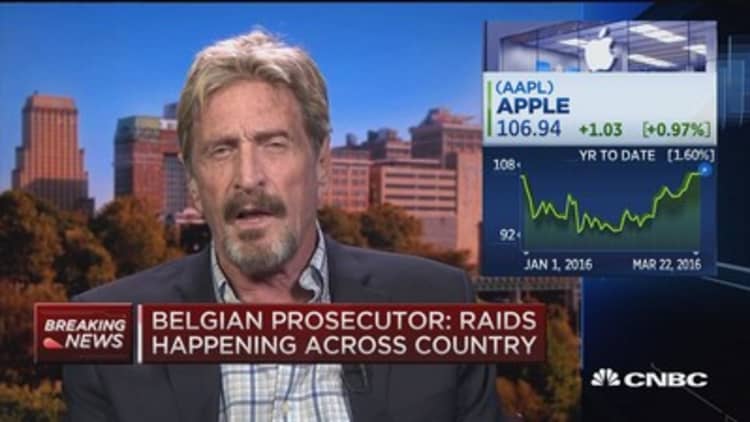
John McAfee said he's not the third party helping unlock an iPhone used by a terrorist — but he knows who is — and he's not fond of their approach.
"I promise you that [Apple CEO] Tim Cook and Apple are not going to be happy with the solution that the FBI has come up with," McAfee, the controversial technology executive, told CNBC's "Power Lunch." "Because it is almost as bad as a universal master key."
McAfee is the cybersecurity pioneer behind McAfee Security antivirus software products, now part of Intel. He declined to name with whom, or how, the FBI plans to move forward. But his comments come as the Justice Department says it may have found a third party to hack the iPhone at the center of a cybersecurity standoff.
McAfee has publicly petitioned the FBI to let him hack an iPhone used by a shooter in a deadly December terrorist attack in San Bernardino, California. Apple, the maker of the iPhone, has so far refused, saying a "master key" creates cybersecurity threats to other iPhone users and the government has overstepped the boundaries of the law.
A hearing between Apple and the FBI set for Tuesday afternooon was postponed late Monday after the government said it needed more time to test a method that would eliminate the need for Apple to cooperate. McAfee told CNBC Monday that he was "instrumental in the FBI's change of heart."
"It's much, much easier to break into a phone using this technique," McAfee said. "I'm not fond of it."
To be sure, McAfee is renowned as much for his cybersecurity knowledge as for his exploits, including facetious comments to the press on his run-ins with the law in Belize, driving under the influence in rural Tennessee, provocative online videos and, most recently, a run for the U.S. presidency.
McAfee was critical of the efforts of the U.S. and its allies for tracking terrorist communications. He said the needed technology already exists.
McAfee described a specific device that intercepts phone calls, tracks keystrokes before they are encrypted and takes screen captures. Such a device would make monitoring terrorists "trivial," he said.
"We don't have a coherent strategy," McAfee said. "We're looking for terrorists here in America. By the time that happens it's way too late."





